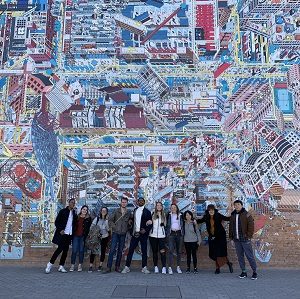Gap Programs
Gap is for Exploring Traveling Learning Growing
Explore Programs for Gap Students
CET Beijing
CET Japan
CET Jordan
CET Shanghai
Note: Due to local visa regulations, gap students cannot choose to conduct an internship while in Shanghai.
CET Siena
CET Taiwan
Why Gap with CET?
CET Academic Programs is a study abroad organization that has been developing and operating innovative educational programs abroad since 1982. Originally “China Educational Tours,” CET began operations in Beijing, later expanding to other locations around the world. Today, CET offers a varied portfolio of semester, summer, and customized programs around the world for college, high school, and gap year students. Learn more about our history.
CET programs prioritize meaningful local connections and engaging immersion opportunities. From local roommates and language partners to excursions and internship placements, we aim to give you a well-rounded experience with insider-access to the local culture. Learn more about the roommate program here.
Study alongside college students from universities throughout the US. Benefit from academically rigorous curriculum and dedicated instructors that use the city as your classroom. Learn more about our commitment to academics here.
Your health and safety is our number one priority.Each program is managed by at least one resident staff member who speaks the local language fluently and has previous experience living in the region. Overseas staff members undergo a thorough and ongoing training which includes instruction and guidance for the prevention and management of on-site emergencies. Read more about our approach to student support and comprehensive risk management strategies.
More than Forty Years of Experience
CET Academic Programs is a study abroad organization that has been developing and operating innovative educational programs abroad since 1982. Originally “China Educational Tours,” CET began operations in Beijing, later expanding to other locations around the world. Today, CET offers a varied portfolio of semester, summer, and customized programs around the world for college, high school, and gap year students. Learn more about our history.
Thoughtful Program Design
CET Academic Programs is a study abroad organization that has been developing and operating innovative educational programs abroad since 1982. Originally “China Educational Tours,” CET began operations in Beijing, later expanding to other locations around the world. Today, CET offers a varied portfolio of semester, summer, and customized programs around the world for college, high school, and gap year students. Learn more about our history.
College-Level Academics
CET Academic Programs is a study abroad organization that has been developing and operating innovative educational programs abroad since 1982. Originally “China Educational Tours,” CET began operations in Beijing, later expanding to other locations around the world. Today, CET offers a varied portfolio of semester, summer, and customized programs around the world for college, high school, and gap year students. Learn more about our history.
Robust Student Support and Risk Management
Gap Student Alumni

Clara | CET beijing
“Do a gap program! […] The most intimidating situations are often the ones that end up being the most rewarding, especially when it comes to language and cultural experiences.” Read the rest of Clara’s reflection on her gap program.

Anna | CET beijing
“[CET] taught me to be more open minded, more willing to try new things, and more capable of figuring things out, things I would never have learned from a strictly in-class or non-immersive experience. I also made incredible memories from the good times and the not-so-perfect moments. For anyone thinking about studying a language in college, the CET program is perfect. It offers a realistic experience of what college-level language rigor looks like, tips and tricks for learning and studying a language, and an incredible travel opportunity to mix with different cultures and adjust to new places.”

Grace | CET Jordan
Check out some of Grace’s blog posts during her summer in Amman, Jordan:
Program Eligibility
CET welcomes applications from gap students who will be 18 or older at the time of program participation (or earlier, in some cases, due to visa requirements). Students must have a high school diploma and generally a cumulative high school grade point average of 3.0 or higher. However, admissions decisions are made holistically, on a case-by-case basis, so students with lower GPAs are encouraged to apply.
We believe in making study abroad accessible to all students. We recruit and actively support academically qualified students of all races, religions, origins, abilities, gender identities, and sexual orientations. Learn more about the application process.
Read More about
Connect with us!
Students and Families: Have questions about CET or how to get started? Need advice in choosing which program would be best for you? We’re here to help!
Educators, Gap Counselors, and Education Consultants: Know a student who might benefit from taking gap time with CET? We welcome your referrals. Learn more about our work with high schools.